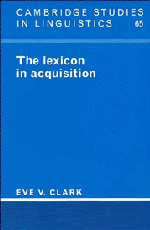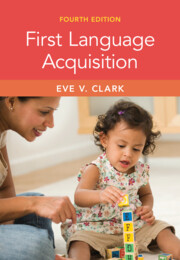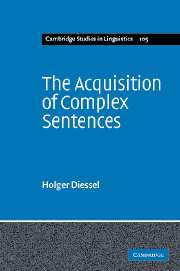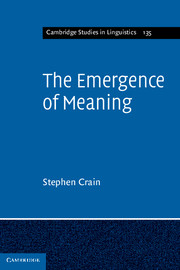The Lexicon in Acquisition
Eve Clark argues for the centrality of the lexicon in language and language acquisition. She looks at the hypotheses children draw on about possible word meanings, and how they map their meanings onto forms. Starting with children's emerging knowledge of conventional words and meanings, she takes up their growing knowledge of word structure as reflected in their formation of new words. The Lexicon in Acquisition synthesizes Professor Clark's widely respected work in the field, and will interest linguists, psychologists, and cognitive scientists.
- Language acquisition is a key topic for linguists
- Clark is known to linguists and psychologists
- Fresh look at acquisition because it concentrates on words rather than sounds and structures
- Also looks at children's lexical innovations
Reviews & endorsements
"An elegant, clearly-written, and detailed account of Clark's work...bringing together theory and data from a number of different types of languages. Clark makes skillful use of the interplay of crosslinguistic data to illuminate all of the components of the theory as well as the role of the linguistic typology in [lexical] acquisition. A landmark book in the study of the lexicon, with special significance for aquisition theory. The book will be of interest to a broad range of linguists, psycholinguists, and developmental psychologists, as well as people working in other areas of cognitive science and education." Dan I. Slobin, University of California at Berkeley
"A deep and important contribution from the perspective of Clark's own theorizing on conventionality and contrast, and on the simplicity/transparency issue....A contribution of great interest, required reading for everyone in the field of language acquisition who is interested in the lexicon." Lila R. Gleitman, University of Pennsylvania
Product details
March 1995Paperback
9780521484640
320 pages
229 × 152 × 18 mm
0.47kg
Available
Table of Contents
- 1. The lexicon: words old and new
- Part I. Lexical Acquisition:
- 2. Early lexical development
- 3. The mapping problem
- 4. Conventionality and contrast
- 5. Pragmatic principles and acquisition
- 6. Transparency and simplicity
- 7. Productivity
- Part II. Case Studies of Lexical Innovation:
- 8. Words for things
- 9. More words for things
- 10. Words for agents and instruments
- 11. Words for actions
- 12. Words for undoing actions
- Part III. Conclusion:
- 13. Issues for acquisition
- Bibliography
- Index of names
- Index of subjects.











